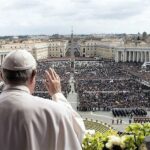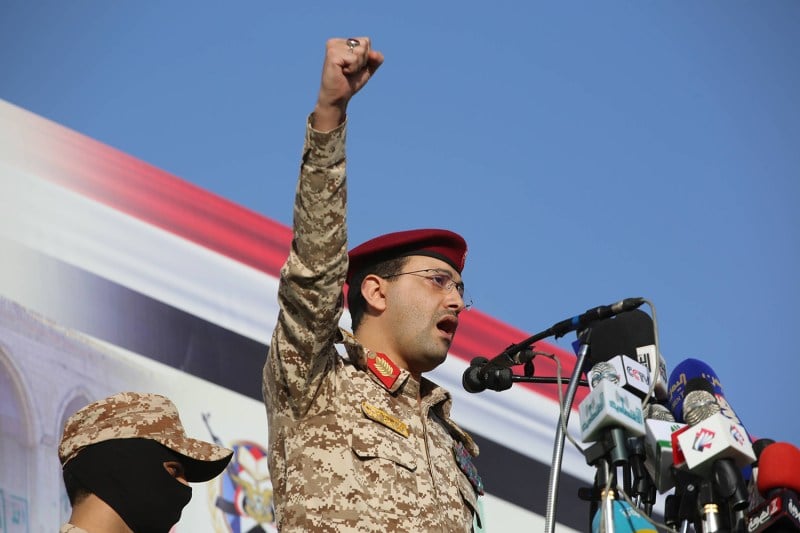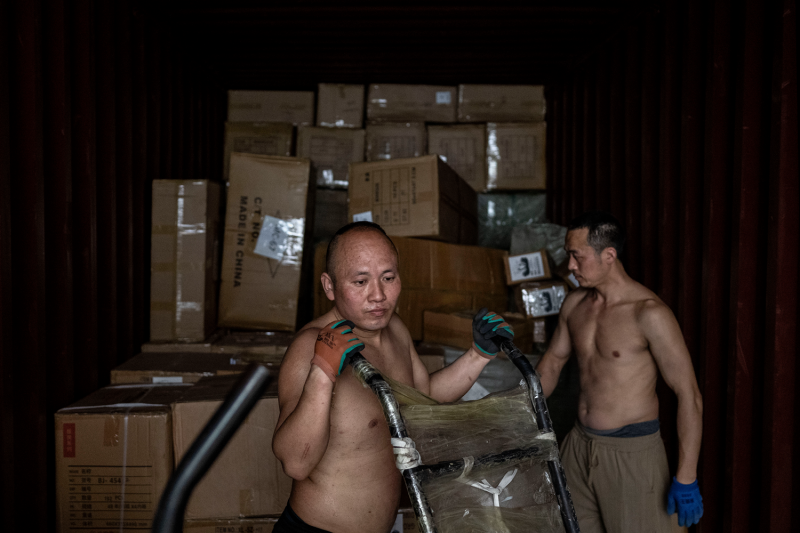Trump, Starmer Celebrate ‘Breakthrough’ U.S.-U.K. Trade Deal

Trump, Starmer Celebrate ‘Breakthrough’ U.S.-U.K. Trade Deal
This is the White House’s first major trade agreement since it issued sweeping reciprocal tariffs last month.
U.S. President Donald Trump (left) shakes hands with British ambassador to the United States Peter Mandelson after making a trade announcement at the White House in Washington on May 8. Jim Watson/AFP via Getty Images
Welcome back to World Brief, where we’re looking at a major trade deal between the United States and the United Kingdom, the Vatican selecting an American for pope, and the ongoing clash between India and Pakistan.
The Skinny Deal
The United States and United Kingdom announced a “breakthrough” trade deal on Thursday that will lift some (but not all) U.S. tariffs on British goods. Both U.S. President Donald Trump and British Prime Minister Keir Starmer heralded the agreement as a vital step toward improving trade relations.
Welcome back to World Brief, where we’re looking at a major trade deal between the United States and the United Kingdom, the Vatican selecting an American for pope, and the ongoing clash between India and Pakistan.
The Skinny Deal
The United States and United Kingdom announced a “breakthrough” trade deal on Thursday that will lift some (but not all) U.S. tariffs on British goods. Both U.S. President Donald Trump and British Prime Minister Keir Starmer heralded the agreement as a vital step toward improving trade relations.
“We are the first country to secure such a deal with the United States, and in an era of global insecurity and instability, that is so important,” Starmer said on Thursday. This is the first trade deal that the United States has reached since the White House’s sweeping reciprocal tariffs wreaked havoc on global stock markets last month and raised fears of a U.S. recession.
Under the framework agreement, Washington will lift 25 percent levies on British steel and aluminum, cut duties on almost all British car imports from 27.5 percent to 10 percent, and allow Rolls-Royce engines and plane parts to enter tariff-free. In return, U.S. companies will have better market access to British beef, ethanol, and other farm products worth around $5 billion; and London will commit to purchasing $10 billion worth of Boeing planes.
Notably, though, Trump’s baseline 10 percent reciprocal duty on most British goods will remain in place.
“The U.S.-U.K. skinny deal is a modest improvement compared to the reality before its announcement,” Ryan Bourne, an economist at the Cato Institute, told FP’s World Brief. “But with most U.S. tariffs still in place and a fairly narrow overall scope of the deal, we remain in a less free trading environment than the pre-Trump status quo and a far worse situation than if this was a comprehensive free trade agreement.”
The United Kingdom is the 11th-biggest trading partner of the United States in terms of goods, but the United States is the largest single trading partner for Britain. Some experts suggest that this makes the deal more important for London than it is for Washington.
Since leaving the European Union in 2020, the United Kingdom has pushed for new trade agreements with individual countries. On Tuesday, London inked its largest trade deal yet with India, in an agreement that the British government said will increase trade between the two countries by roughly $35 billion a year by 2040.
Yet Thursday’s deal also signals momentum for the Trump administration, which is hoping to secure more trade agreements. The White House has said that Trump’s tariffs have brought countries such as Japan, South Korea, Vietnam, and India to the negotiating table, and on Saturday, U.S. Treasury Secretary Scott Bessent and Trade Representative Jamieson Greer will meet with Chinese Vice Premier He Lifeng, the country’s top economic official, in Switzerland for trade talks.
“One hopes that this can be the basis for future talks and more tariffs being lowered,” Bourne said of the U.S.-U.K. deal. “Yet given the glee with which [U.S. Commerce Secretary] Howard Lutnick celebrated the extra tariff revenue from U.K.-U.S. trade, perhaps today indicates that substantial tariffs are here to stay in the U.S. under Trump, and the best other countries can do is nibble around the edges for exceptions in important sectors.”
Today’s Most Read
- The Pentagon Fixates on War Over Taiwan by James Palmer
- What Is the Risk of a Conflict Spiral Between India and Pakistan? by Sumit Ganguly
- Why Singapore’s Ruling Party Won Yet Again by Salil Tripathi
What We’re Following
An American pope. After roughly 24 hours sequestered at the Vatican, Catholic cardinals on Thursday chose Robert Prevost (to be known as Pope Leo XIV) as the next pope. He will be the first American pontiff in the church’s history.
A Chicago native who also holds Peruvian citizenship, Prevost assumes the papacy at a time of great turmoil within both the church and the world. Since the death of Pope Francis last month, the Vatican has been forced to decide whether it should continue Francis’s more progressive platforms or acquiesce to conservative demands. Choosing Prevost suggests a compromise; the 69-year-old is considered a centrist who has backed Francis’s devotion to social justice yet has been less welcoming of the LGBTQ community.
“Peace be with you all,” Prevost said in his first remarks as pope, addressing a large crowd gathered in Vatican City’s St. Peter’s Square. “I, too, would like this greeting of peace to enter your hearts, to reach your families, to all people everywhere, to all the earth.”
Competing narratives. India said on Thursday that it had “neutralized” Pakistani drone and missile attacks on military targets in the country’s north and west regions. New Delhi’s Defense Ministry also said it “targeted air defense radars and systems at a number of locations in Pakistan,” including an air defense system in Pakistan’s second-largest city, Lahore. Islamabad, meanwhile, claimed on Thursday to have intercepted 25 Indian drones near several Pakistani cities.
The dueling claims are the latest developments in an ongoing military faceoff between the two nuclear-armed powers that experts fear could escalate and embroil the region in all-out war. However, FP editor in chief Ravi Agrawal argues that these dueling claims could actually help both sides de-escalate.
“The media narratives in India and Pakistan could once again prove to be an important route for both governments to claim some form of victory for their respective populations,” Agrawal writes.
Friendship in Moscow. Chinese President Xi Jinping met with Russian President Vladimir Putin in Moscow on Thursday ahead of Victory Day celebrations commemorating the surrender of Nazi Germany in World War II 80 years ago. Invoking that time in history, Xi likened U.S. “hegemony” to the “arrogant fascist forces” of Nazi Germany, and he vowed to strengthen the China-Russia alliance to counter the U.S.-led international order.
The Kremlin struck a similar tone on Thursday. Europe is “preparing for war with Russia like the Third Reich once did,” the Russian Foreign Ministry said, according to the state-run TASS news agency. Putin has framed Friday’s V-Day parade—to be attended by 29 foreign leaders, including Xi—as proof that Western efforts to isolate Russia for its war in Ukraine have largely failed.
Yet, attacks by both Russian and Ukrainian forces on Thursday undermined Moscow’s messaging. Earlier this week, Putin declared a unilateral three-day cease-fire beginning Thursday. But Ukrainian Foreign Minister Andrii Sybiha accused the Kremlin of violating its own truce 734 times between midnight and midday Thursday. Kyiv never agreed to the temporary cease-fire, calling it a “theatrical play” and warning that Ukraine “cannot be held responsible for what happens on the territory of the Russian Federation” on Friday.
Indirect dialogue. Syria has held indirect talks with Israel to discuss de-escalating tensions, Syrian President Ahmed al-Sharaa said on Wednesday after meeting with French President Emmanuel Macron in Paris. The Syrian president’s admission marks a significant change for historically antagonistic relations between the two countries.
It is unclear who set up the back channel. Lana Nusseibeh, an Emirati Foreign Ministry official, has denied reports that Abu Dhabi was involved. The office of Israeli Prime Minister Benjamin Netanyahu has also declined to comment on Sharaa’s statement.
Since Islamist rebels led by Sharaa overthrew Syrian dictator Bashar al-Assad last December, Israel has carried out hundreds of strikes inside Syria. These include Israeli fighter jets targeting Damascus on Friday in what Netanyahu has called part of an effort to protect the country’s Druze religious minority. On Wednesday, Israeli police said they were now operating inside of Syria for the first time.
Odds and Ends
Instead of 100 men versus one gorilla, try 5.3 million New Zealanders against 23.6 million sheep. The Pacific island nation has long been the brunt of jokes for having vastly more sheep than it does people; in 1982, there were 22 sheep per one Kiwi in the country. However, the government announced on Tuesday that new data indicates that humans are catching up, with just 4.5 sheep in New Zealand per one person. Baaaaa-d news for Wellington’s lambs.
Alexandra Sharp is the World Brief writer at Foreign Policy. X: @AlexandraSSharp
More from Foreign Policy
-

Eight people dressed in camouflage military combat uniforms wade across a river, the water up to their waists. The soldiers carry large backpacks along with their rifles. Snowcapped mountains and a thick forest of evergreen trees loom in the distance. Get Ready for the Aleutian Island Crisis
As conflict heats up in the Arctic, foreign adversaries eye Alaskan territory.
-

U.S. President Donald Trump speaks to reporters before boarding Air Force One at Morristown Municipal Airport in Morristown, New Jersey, on April 27. Trump’s First 100 Days Reveal a ‘Strongman’s’ Unprecedented Weakness
No U.S. president has ever surrendered global power so quickly.
-

An elderly man and woman sit on the ground, the man on his knees as he sorts through something on the ground. Behind him are a rusted cart and bicycle in front of a paint-smeared concrete wall and a battered corrugated metal sign with the words USAID: From the American people” on it. What Trump’s New Budget Says About U.S. Foreign Policy
The president wants to significantly pull back on many of America’s traditional global engagements while spending more on the border and defense.
-

U.S. President Donald Trump listens to Secretary of State Marco Rubio at a cabinet meeting in the White House in Washington, D.C. Rubio’s Reorganization Plan Is a Wrecking Ball
The State Department revamp goes far beyond streamlining—it will devalue human rights and strip away critical expertise.









Join the Conversation
Commenting on this and other recent articles is just one benefit of a Foreign Policy subscription.
Already a subscriber?
.
Subscribe
Subscribe
View Comments
Join the Conversation
Join the conversation on this and other recent Foreign Policy articles when you subscribe now.
Subscribe
Subscribe
Not your account?
View Comments
Join the Conversation
Please follow our comment guidelines, stay on topic, and be civil, courteous, and respectful of others’ beliefs.
Change your username |
Log out
Change your username:
CANCEL
Confirm your username to get started.
The default username below has been generated using the first name and last initial on your FP subscriber account. Usernames may be updated at any time and must not contain inappropriate or offensive language.